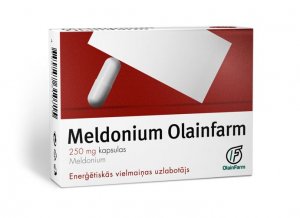Tennis superstar Maria Sharapova has admitted using the performance-enhancing drug meldonium (mildronate) for the past 10 years. Her drug use was given the blessing of the International Tennis Federation (ITF) for most of that time. It was only when the World Anti-Doping Agency (WADA) arbitrarily and capriciously decided to ban the use of meldonium on January 1, 2016 that her PED use became a problem.
Sharapova made the announcement at a downtown Los Angeles hotel in a hastily-arranged press conference on March 7, 2016. Most sports writers thought that the 28-year old was going to announce her retirement. Instead, Sharapova shocked everyone by revealing that she had failed an anti-doping test during her participation in the 2016 Australian Open in January.
“For the past 10 years I have been given a medicine called mildronate by my family doctor and a few days ago after I received the ITF letter I found out that it also has another name of meldonium which I did not know. It is very important for you to understand that for 10 years this medicine was not on Wada’s banned list and I had legally been taking the medicine for the past 10 years. But on 1 January the rules had changed and meldonium became a prohibited substance which I had not known. I failed the test and I take full responsibility for it. I made a huge mistake.”
As a performance-enhancing drug, meldonium has been used by athletes in various sports for its mild stimulant-like properties. It is a relatively safe and non-toxic drug. Athletes have used it in performance-enhancing dosages of 1000-2000mg/day in divided dosages preferably prior to training in order to take advantage of its stimulant properties.
Meldonium was first developed and marketed by the Latvia-based pharmaceutical company Grindeks. It has been used clinically as an anti-ischemic drug to treat patients with angina and myocardial infarction. Of interest to athletes is the finding that it consistently and significantly improves exercise tolerance. Some pharmaceutical companies have recently marketed it explicitly as a performance-enhancing drug. The drug has been particularly popular among athletes from Russia and other former Soviet republics for over 10 years. During this period, meldonium also gained popularity as a “smart drug” among non-athletes.
Sharapova denied using meldonium for performance-enhancing purposes. Instead, she claimed she used it for 10 years for therapeutic purposes suggesting that the blood flow drug was used to treat symptoms of a magnesium deficiency, irregular EKGs and indications of diabetes.
“It made me healthy, and that’s why I continued to take it,” Sharapova said defending her use of the drug.
The World Anti-Doping Agency first added meldonium to its “monitoring program” in 2015. The WADA monitoring program includes drugs that numerous athletes are known to use and monitors the substances in order to detect patterns of misuse in sport. In Septmber 2015, WADA decided to add the drug to its 2016 banned list due to “evidence of its use by athletes with the intention of enhancing performance”.
“For a substance or method to be prohibited, it must meet two of three criteria: enhance performance; pose a threat to athlete health; violate the spirit of sport,” according to a WADA spokesperson.
WADA notified all its national anti-doping organizations of the addition of meldonium to its banned list and gave them 3 months to notify their athletes of the rule changes. The Russian Anti-Doping Agency (RUSADA) notified its athletes via its website on September 30, 2015. In addition, WADA sent Sharapova an email on December 22, 2015 warning her of the addition of meldonium to the banned substance list.
Sharapova pleaded ignorance and claimed she had no idea that meldonium had recently been banned. She acknowledged that she failed to read the messages and warnings from WADA and RUSADA about the rule change.
Of course, ignorance is no excuse when it comes to the violation of anti-doping rules in WADA-sanctioned sports. The ITF’s “Tennis Anti-Doping Programme 2016” specifies a “period of ineligibility” of four years for athletes who intentionally use a banned PED and two years for athletes who unintentionally use a banned PED.
If it were any other athlete other than Sharapova, a 2-4 year suspension would be guaranteed. However, given that Sharapova is one of the most popular, recognizable, marketable and popular athletes in the sport of tennis, it is possible that she could see a reduced penalty although the special treatment would not come without controversy.
The arbitrary and capricious nature of WADA’s decision to say a drug is morally unacceptable after being morally acceptable for years may also work in Sharapova’s favor.
Sharapova was ranked number one on the Forbes’ list of the World’s Highest-Paid Female Athletes in 2015 and number 26 on the list of the World’s Highest-Paid Athletes (male and female) in 2015. She earned an estimated $29.7 million during this period with approximately $23 million of that coming from endorsements. She has had endorsement deals with Nike, Avon Products, Evian, TAG Heuer, Canon, Cole Haan, Ericsson, Gatorade, Head, Land Rover, Motorola, Porsche, Prince, Samsung, Sony, Tiffany’s and Tropicana.
Given the circumstances surrounding Sharapova’s PED use, branding and marketing experts consider it unlikely that all of her sponsors will abandon her like they did Lance Armstrong when he admitted using PEDs for over a decade.
David Schwab, the senior vice president and managing director of marketinng firm Octagon First Call, thinks that Sharapova’s sponsors will stand behind her given that the PED she used was legal in sports for over 10 years. Meldonium had only been illegal for a matter of weeks before she was busted.
In the meantime, WADA is standing on the sidelines awaiting the ITF’s decision to suspend Sharapova (or not) before it makes any further comment.
“WADA is aware of the ongoing, and highly publicized, case concerning tennis player, Maria Sharapova,” WADA said in statement. “As is our normal process, and in order to protect the integrity of the case, WADA will refrain from commenting further until a decision has been issued by the International Tennis Federation (ITF). Following that, WADA will review the reasons for the decision and subsequently decide whether or not to use its independent right of appeal to the Court of Arbitration for Sport (CAS).”




